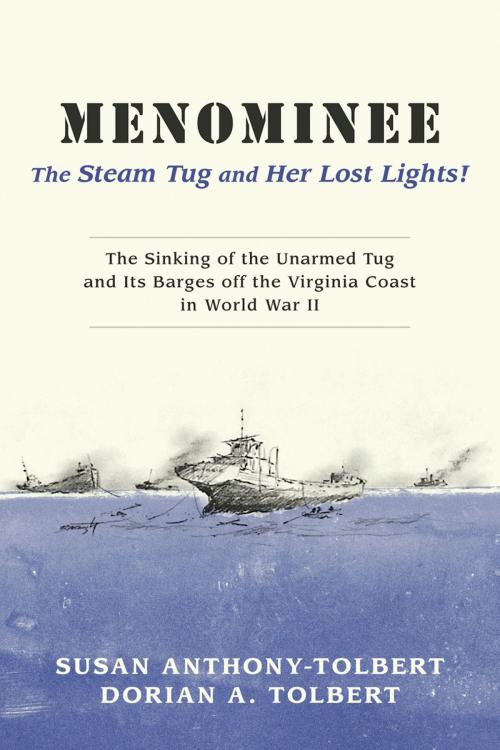Menominee: The Steam Tug and Her Lost Lights!
The Sinking of the Unarmed Tug Off Virginia in W W II.
Nonfiction, History, Military, World War II| Author: | Susan Anthony-Tolbert, Dorian A. Tolbert | ISBN: | 9781483559834 |
| Publisher: | BookBaby | Publication: | October 12, 2015 |
| Imprint: | Language: | English |
| Author: | Susan Anthony-Tolbert, Dorian A. Tolbert |
| ISBN: | 9781483559834 |
| Publisher: | BookBaby |
| Publication: | October 12, 2015 |
| Imprint: | |
| Language: | English |
The tug, Menominee, and its tow of three barges left Norfolk/Hampton Roads, Virginia to deliver lumber and coal to Connecticut on March 31, 1941. It crossed the mouth of the Chesapeake Bay and headed north up the coast of Virginia’s Eastern shore. The Menominee and her barges would never arrive. The German submarine, U-754, was waiting in the waters along the Atlantic seacoast off the Eastern Shore of Virginia as the tug traveled north. The relentless attack of the sub, U-754, orchestrated by Captain Oestermann on an unarmed tug and its tow and the aftermath are the subjects of this story. Though Captain Leslie F. Haynie of Reedville, Virginia tried valiantly to outwit and to outrun the sub, the tug was no match. Sixteen Merchant Mariners in the crew of the Menominee died in that attack. The account of the sinking of the tug and two of its barges are based on historical information from government documents, World War II books, Merchant Marine websites, U-boat websites and research from local newspapers and historical societies. There were also interviews with relatives of men who lost their lives when the Menominee was sunk. Court papers from law suits against the owners of the Menominee were used to present eyewitness testimony as to what happened on the night of March 31, 1941.The proximity to the Virginia coast and the number of German subs in the Atlantic seaboard frame this account. The Chesapeake Bay during WW II is emphasized. There are discussions of the German U-boat program to harass U.S. shipping as well as Allied shipping especially during 1942 and 1943. Captain Oestermann presents as rather ruthless in his attacks on unarmed vessels such as the Menominee and later on a fishing vessel, The Ebb. He certainly seems to have followed the motto of “Take No Survivors!” Historians have wondered if he would have been tried as a war criminal had his sub not been sunk with all hands lost. In addition the story of the Menominee contains a wonderful interview account of life on the tugs and the barges of that period in American history. This is a segment of life that should not be forgotten. Thanks to the memory of the brother of one of the Merchant Marines, who died when the Menominee went down, the book gives an interesting account of that life during WW II. Contributions from the Merchant Mariners are also presented. No story of the German subs in the Atlantic and specifically off the Virginia coast and their attacks on U.S. shipping and Allied shipping would be complete without a discussion of the “secrecy” maintained by the government. This secrecy about the threat as well as the extent of the German U-boat presence on the coastline imposed by the government of the United States due to wartime demands are highlighted
The tug, Menominee, and its tow of three barges left Norfolk/Hampton Roads, Virginia to deliver lumber and coal to Connecticut on March 31, 1941. It crossed the mouth of the Chesapeake Bay and headed north up the coast of Virginia’s Eastern shore. The Menominee and her barges would never arrive. The German submarine, U-754, was waiting in the waters along the Atlantic seacoast off the Eastern Shore of Virginia as the tug traveled north. The relentless attack of the sub, U-754, orchestrated by Captain Oestermann on an unarmed tug and its tow and the aftermath are the subjects of this story. Though Captain Leslie F. Haynie of Reedville, Virginia tried valiantly to outwit and to outrun the sub, the tug was no match. Sixteen Merchant Mariners in the crew of the Menominee died in that attack. The account of the sinking of the tug and two of its barges are based on historical information from government documents, World War II books, Merchant Marine websites, U-boat websites and research from local newspapers and historical societies. There were also interviews with relatives of men who lost their lives when the Menominee was sunk. Court papers from law suits against the owners of the Menominee were used to present eyewitness testimony as to what happened on the night of March 31, 1941.The proximity to the Virginia coast and the number of German subs in the Atlantic seaboard frame this account. The Chesapeake Bay during WW II is emphasized. There are discussions of the German U-boat program to harass U.S. shipping as well as Allied shipping especially during 1942 and 1943. Captain Oestermann presents as rather ruthless in his attacks on unarmed vessels such as the Menominee and later on a fishing vessel, The Ebb. He certainly seems to have followed the motto of “Take No Survivors!” Historians have wondered if he would have been tried as a war criminal had his sub not been sunk with all hands lost. In addition the story of the Menominee contains a wonderful interview account of life on the tugs and the barges of that period in American history. This is a segment of life that should not be forgotten. Thanks to the memory of the brother of one of the Merchant Marines, who died when the Menominee went down, the book gives an interesting account of that life during WW II. Contributions from the Merchant Mariners are also presented. No story of the German subs in the Atlantic and specifically off the Virginia coast and their attacks on U.S. shipping and Allied shipping would be complete without a discussion of the “secrecy” maintained by the government. This secrecy about the threat as well as the extent of the German U-boat presence on the coastline imposed by the government of the United States due to wartime demands are highlighted















